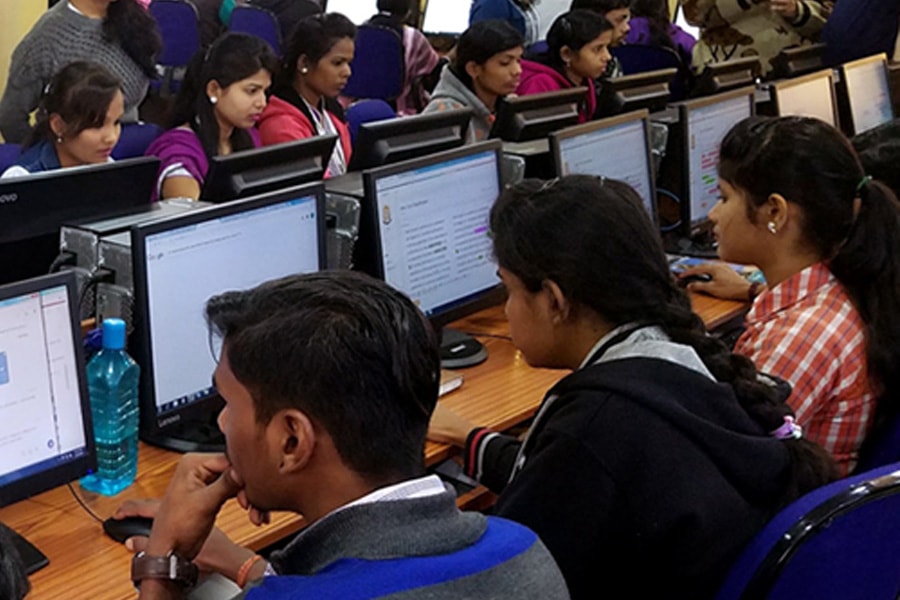
Building a Path to Empowerment
The Dempo Group, CMU and iMerit Work Together To Bring the Underserved in India to the New Digital Economy
In a small Muslim community in eastern India, about 4,000 miles from Pittsburgh, information technology is transforming the lives of young women and their families, thanks to the concept of digital inclusion.
It was there that Sunder Kekre, the Vasantrao Dempo Professor of Operations Management at Carnegie Mellon University's Tepper School of Business, visited iMerit at the invitation of the company's CEO, Radha Basu. The company provides a broad array of data annotation services focused on machine learning and computer vision to customer service, spanning organizations within the retail and financial services sector. Beyond that, the company is committed to human empowerment, with a focus on women and marginalized youth.
Roughly half of the company's workforce is women, and 80 percent of its employees come from families with monthly incomes under 100 U.S. dollars. Now, through a technology training program developed by a team from CMU, they have the ability to earn an income that not only can sustain their families, but also allow them to remain in their hometowns. By learning about machine learning and computer vision, the employees are able to create a more robust livelihood while gaining confidence, independence and a new voice in their communities.
Kekre's visit to iMerit has led to a new global collaboration that seeks to answer some of the most pressing questions related to both technology and society.
"What struck me was the idea of human knowledge powering machine learning. I felt that here was a dimension that we needed to explore, understand and support," Kekre said.
He took the idea to Shrinivas Dempo, who graduated with a master's degree in industrial administration from CMU in 1995. Dempo, chairman of the Dempo Group in India, offered to fund a research and development collaboration with iMerit through Kekre's endowed chair. Roni Rosenfeld, a professor in the Machine Learning Department at Carnegie Mellon's School of Computer Science, had worked extensively in this area and joined the effort.
"We spent a lot of time trying to understand the approach and the challenges faced by iMerit in building its capabilities. We made it a point to look at the human angle first, and then the technology," Rosenfeld said. "The priority was not automation, but capability building. We decided to build some supporting technology for the iMerit team in its efforts to learn language annotation for natural language tasks. This is one of the most aspirational and dramatic leaps of capability for the impact workforce."
Rosenfield guided Daniel Wen, now a junior studying computer science, to build systems that could help train iMerit's new staff. Wen created multiple algorithms to enhance the staff training process and integrated them with iMerit's existing toolkit.
"It was like going back to school. It was exhilarating to trade ideas with the CMU team," said Jai Natarajan, iMerit's vice president of technology.
Wen's results were promising and subsequently Abhinav Maurya, a doctoral student at Carnegie Mellon's Heinz College of Information Systems and Public Policy, carried the work forward with the guidance of Rahul Telang, Heinz College professor of information systems who also holds a courtesy appointment with the Tepper School.
"I've rarely known so many people to align so quickly in a project. I think the cause spoke to something in all of us," Telang said.
In January 2018, Kekre returned to India to help iMerit test the CMU team's solutions in an experiment with 28 new hires.
"I was amazed at how ambitious and open to absorbing new technology the team was," Maurya said. "It offers a new perspective for those of us who look at data all day in academia."
The CMU team is analyzing the data and designing additional experiments, which will explore how automated algorithms can enhance practical training and how humans respond to machine learning from their complex domains. Meanwhile, Rosenfeld s planning to visit India and is working with Wen and others to explore the use of computer vision with iMerit.
Dempo is keenly watching the progress.
"This isn't about just iMerit or Carnegie Mellon. It's bigger than all of us," he said. "We have to take the lead in answering these key questions for Indian society. How do we provide digital inclusion for marginalized youth? How do we do well by doing good?"
Radha Basu, CEO of iMerit, praised the Carnegie Mellon team's participation.
"The future of work will involve human expertise alongside machine intelligence. The power of human insight trains the machine and drives its development. We are rapidly building understanding of this through our services for customers," Basu noted. "It turns out that no matter how much technology we are used to, we are always drawn to the human factor in the equation."
Bob Dammon, dean of the Tepper School and professor of financial economics, sees the power of cross-campus collaboration.
"This critical research is another example of how Carnegie Mellon University and the Tepper School collaborate to solve important societal problems," Dammon said.
For Kekre, the project was a true labor of love.
"It gives me a chance to take the best that CMU has to offer and — with the help of our alums such as Shrinivas Dempo and friends like Radha Basu — to make a meaningful synergistic impact to these aspiring youth in India," he said. "I now see the power behind our founder Andrew Carnegie's words: 'My heart is in the work.'"